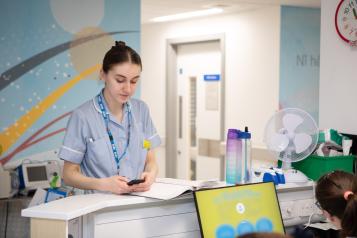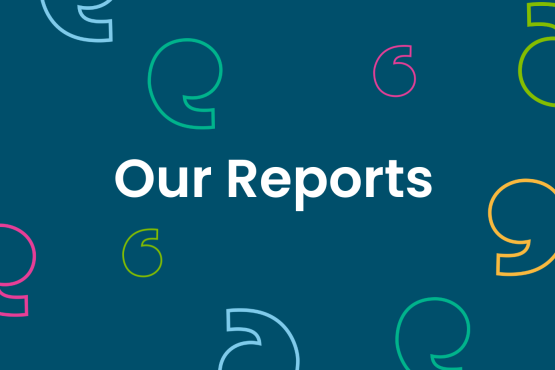How accessible is your healthcare?

In 2022, we launched the Your Care, Your Way campaign, which highlighted that people who are deaf, blind or who have a learning disability are blocked from accessing healthcare, as services don't meet their communication needs. We uncovered that many healthcare providers don't meet their duties under the 2016 NHS Accessible Information Standard (AIS), which requires them to support people to communicate with staff and clinicians, provide healthcare information in accessible formats and record people's communication needs in their records.
Working with leading charities, we called for NHS England to strengthen the AIS. A revised version is due out this year but while we await its publication, we continue to hear from people and their carers about lack of required support.
Trends in the public feedback
In February, we analysed feedback from patients with communication needs that we received via our web form and through local Healthwatch.
Key issues:
- People continue to struggle to access health and care services.
- People continue to struggle to communicate with health and care services, where communication support is difficult and lacking.
- People with communication needs do not always get the adjustments they need, leading to poorer quality of care.
Access to services
Lack of face-to-face appointments
Face-to-face appointments with healthcare professionals are crucial for patients who have a hearing impairment. However, many people reported that they could not access GP face-to-face appointments. For instance, one person was told that they needed to undergo additional tests to "prove" they had hearing loss despite having a diagnosed hearing condition before being able to book a face-to-face appointment.
Some people reported that they had to incur financial costs as they had to arrange communication help themselves.
"I repeatedly told the reception staff that I cannot hear them over the phone and therefore telephone consultations are inappropriate for me... Although I have health conditions I need to get sorted, I can't arrange a face-to-face consultation." Story shared by Healthwatch Warwickshire
Issues booking appointments
Some people who have a visual impairment reported that online systems were difficult to use or incompatible with communication software (e.g. screen readers). Some patients struggled to get to new health and care facilities due to not receiving prior information about the need to navigate busy roads, poorly marked pedestrian crossings, and unfamiliar layouts. This resulted in people being late to appointments and putting them in potentially unsafe situations.
Healthwatch Leeds noted that this highlights the need for appropriate, clear information being given to people at the time of appointment booking.
People with hearing impairments had difficulty booking appointments over the phone. Often, they weren't offered more accessible appointment booking methods.
Communication with services
Inaccessible formats
People continue to receive information from health services in inaccessible or inappropriate formats. For instance, people with visual impairments told us of receiving hard copy letters instead of digital formats, and people with hearing impairments described receiving phone calls rather than emails or a relay service.
We also heard instances of improper use of Braille, small text on medication leaflets, and complex medical language.
Healthwatch Walsall found that only 36% of local people with communication needs said they could understand all the information given by health and care services. In the same report, 21 people (out of 58) said health or care services had refused to provide them with information in a way that they could understand, even though they had asked for it.
Healthwatch Greenwich noted that information is often provided in Braille, which is not understood by all with vision loss. Healthwatch Stoke-on-Trent found that information in Braille supplied by the NHS is often "squashed and illegible" due to the use of rollers in postal systems. However, this problem is mitigated in other sectors (e.g. banking).
"They send me letters and I cannot read them. I have told them via phone calls, but they never change it."Story shared by Healthwatch Birmingham
Issues booking BSL support
People with hearing impairments reported having issues with services failing to book BSL interpreters, leading to cancelled and rebooked appointments:
- Healthwatch Rotherham found that a lack of face-to-face interpreters made it incredibly difficult for people to access the help, support, and treatment they needed.
- Healthwatch Bolton noted that there was also confusion around who is responsible for booking interpreters for appointments.
- People that Healthwatch Stoke-on-Trent spoke to said there was an assumption in the NHS that family or friends would step in and meet people's needs to get to appointments, read letters, etc. This assumption can feel disempowering to people without support and takes away confidentiality and independence.
"Two weeks before the appointment I phone the hospital to ask, 'Has an interpreter been booked', they say, 'Oh I am doing that today.' I tell them 2 weeks' notice is unlikely you'll get an interpreter but give it a go. Then my appointment gets cancelled and off we go around in this cycle again and again." Story shared by Healthwatch Isle of Wight
Quality of care
People reported services failing to provide reasonable adjustments that prevented them from either understanding or accessing care. For instance, some people didn't know when they have been called through for their appointments:
- People with visual impairments not being audibly called, or not able to follow the health care professional to the consultation room.
- People with hearing impairment being unable to hear their name and/or being called without visual cues (e.g. call screens).
"Nothing like finding out you're marked as not attending because you didn't hear your name or left standing in a room because the staff walked off and you couldn't see to follow them."Story shared by Healthwatch Norfolk
At the same time, people who have a learning disability reported not being given enough time to explain their needs.
In their reports, Healthwatch Greenwich, Healthwatch Stoke-on-Trent, and Healthwatch Leeds noted that people with visual impairment felt as though they were all treated the same despite wide variation in condition severity.
Impact of inaccessible healthcare
People who received inappropriate and/or inaccessible information reported feeling disempowered and anxious when they couldn't get the care they needed and if their condition worsened.
- Healthwatch Leeds gathered the feedback of a person with visual impairment who felt uncomfortable sharing personal information with third-sector organisations to understand information sent in inaccessible formats, though it was necessary.
- Healthwatch in East Berkshire published a partnership report which included a story from a person who lost their partner who had a hearing impairment. Their partner was given no accessible information in primary, secondary, or urgent care, resulting in difficulty communicating and misunderstandings. This was distressing for both, as the person who shared the story also has a hearing impairment.
"[Name deleted] got no access to BSL interpreter, no access to easy read information, no access to receive mobile phone text/emails…I tried to communicate with the nurse and ask where they were going to take [name deleted] 's body. I had not had to deal with this before so I didn't know what would happen and with no access to a BSL interpreter, it made it very difficult for me. It destroyed my goodbye to my partner. It left me with no closure." Story shared by Healthwatch Windsor, Ascot and Maidenhead; Healthwatch Slough; and Healthwatch Bracknell Fores
A clear case for change
Our latest findings are echoed by evidence from national charities supporting people with sensory impairments. A joint report from RNID and Signhealth published in April, found that seven out of 10 Deaf people and people with hearing loss have never been asked about their information and communication needs when accessing NHS care. Only 24% of NHS staff who answered a survey by the charities said they could always meet the information and communication needs of patients who were deaf or had hearing loss.
We have sat on a working group alongside many charities advising NHS England on how to strengthen the current AIS. We have also called on ministers to publicly state their commitment to ensuring the NHS fully complies with the standard.
Our recommendations are:
- Health and care services should be made accountable for fully delivering the AIS by stronger oversight from commissioners and Care Quality Commission inspections.
- Every health and care service should have an accessibility champion.
- IT systems across the NHS should enable digital flags to be added to patients’ medical records about their communication needs and this information should be shared seamlessly between primary, secondary and other types of services.
- Training on accessible information and disability adjustments should be mandatory and provided to all relevant NHS staff.
- Services should involve people with communication needs in helping them self-assess their compliance with the AIS.



